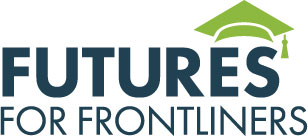 The Futures for Frontliners Application Has Closed.
The Futures for Frontliners Application Has Closed.
Futures for Frontliners is a program that allowed those who worked in essential industries during the COVID-19 pandemic from April 1, 2020-June 30, 2000 to apply by Dec. 31, 2020 for funding to attend MCCC tuition free. Current and future students could elect to pursue an associate degree or skills certificate in dozens of specialty areas* on a full- or part-time basis beginning with the Winter 2021 semester.
In order to be eligible to receive Futures for Frontliners funding, students had to:
- Apply for Futures for Frontliners at www.Michigan.gov/Frontliners. The deadline for applying to the State of Michigan for Futures for Frontliners funding was December 31, 2020.
- Apply to Monroe County Community College at www.monroeccc.edu/apply.
- Submit their FAFSA at www.fafsa.gov.
 Futures for Frontliners funds from the State of Michigan are intended to be ‘last in’ assistance. The amount of assistance from Futures for Frontliners is determined after all Pell Grant or other federal or state grant awards have been determined and applied.
Futures for Frontliners funds from the State of Michigan are intended to be ‘last in’ assistance. The amount of assistance from Futures for Frontliners is determined after all Pell Grant or other federal or state grant awards have been determined and applied.
For more information visit www.Michigan.gov/Frontliners.
During Michigan’s shutdown in spring of 2020 due to the COVID-19, many residents had to put their health and lives on the line working in industries that were critical to keeping our state running. Those frontline workers worked in a job that required them to work outside of their home, putting themselves at risk of exposure. Examples of those industries are listed below. If you’re not sure if your job is eligible, you can call 517-636-7000.
- Chemical supply chains and safety
- Chemical plants
- Laboratories
- Distribution facilities
- Communications and information technology (IT), including news media
- News media
- Telecom companies (e.g. AT&T, T-Mobile)
- Command centers
- Client service centers
- Distribution facilities
- Critical manufacturing
- Manufacturing plants
- Processing plants
- Defense industrial base
- Defense contractors
- IT workers
- Security staff and personnel
- Energy
- Mining companies, production facilities or power plants
- Distribution facilities
- On- or off-shore drilling or renewable energy companies
- Financial services
- Banks
- Non-bank financial or lending companies
- Call centers
- Accounting firms
- Food and agriculture
- Grocery stores or convenience stores
- Restaurants
- Farms or ranches
- Diesel/ethanol facilities, storage facilities, or sawmills
- Distribution facilities
- Laboratories
- Hazardous materials
- Health care and public health
- Clinics
- Hospitals
- Long-term care facilities
- In home care
- Vendors/suppliers/retail facilities for hygiene products and medical goods, supplies, and materials
- Cleaning and waste management facilities, including hazardous waste
- Law enforcement, public safety, and first responders
- Police or fire stations
- Prisons
- Security companies
- Distribution facilities developing or supplying safety equipment and/or uniforms for all public safety personnel
- Vendors or suppliers who maintain and provide services and supplies to public safety facilities
- Other community-based government operations and essential functions
- Local government
- State government
- Public education, including K-12 and higher education
- Zoos or aquariums
- Permitting, licensing, or credentialing offices for essential workers and their operations
- Public works
- Landfill operations
- Dam engineering/inspection companies
- Construction companies
- Structural and bridge inspection companies
- Maintenance companies
- Transportation and logistics
- Warehouse workers
- Transit companies
- Transportation repair shops/companies
- Taxi or ride-sharing companies
- Driving training and education centers
- Towing and recovery or roadside assistance companies
- Water and wastewater
- Wastewater treatment or collection facilities
- Community water system companies/facilities
- Water distribution and testing facilities
- Additional critical infrastructure workers
- Wastewater treatment or collection facilities
- Community water system companies/facilities
- Water distribution and testing facilities
Identified by Governor Whitmer in Executive Orders 2020-21 and 2020-70:
- Workers providing childcare for other critical infrastructure workers, including workers at disaster relief childcare centers
- Workers at suppliers, distribution centers or service providers
- Workers in the insurance industry unable to work remotely
- Workers for businesses or operations that provide minimum basic needs to the economically disadvantaged or otherwise needy individuals, individuals who need assistance as a result of COVID-19 and people with disabilities
- Workers critical to labor union functions unable to work remotely
- Workers at retail stores selling groceries, medical supplies, and products necessary to maintain the safety, sanitation and basic operation of residences or motor vehicles, including convenience stores, pet supply stores, auto supplies and repair stores, hardware and home maintenance stores, and home appliance retailers
- Workers at laundromats, coin laundries and dry cleaners
- Workers for garden stores, nurseries, lawn care, pest control and landscaping operations
- Workers at motor vehicle dealerships or deliver motor vehicles to customers
- Workers at hotels and motels
- Maintenance workers and groundskeepers
- Workers for moving or storage operations
Accounting Certificate
Administrative Office Specialist Certificate
Automotive Engineering Technology Certificate
Automotive Service Technology Certificate
Computer Information Systems: App Development Certificate
Computer Information Systems: System Administration Specialist Certificate
Computer Information Systems: PC Support Technician Certificate
Construction Management Technology: Heavy and Industrial Certificate Criminal Justice Certificate
Construction Management Technology: Residential and Light Commercial Certificate
Criminal Justice Certificate
Culinary Skills and Management Certificate
Cybersecurity and Information Assurance Certificate
Early Childhood Education Certificate
Graphic Design: Digital Media Certificate
Graphic Design: Illustration Certificate
Graphic Design: Web Design Certificate
Mechanical Design Technology Certificate
Metrology Technology Certificate
Practical Nursing Certificate
Product and Process Technology: CAD/CAM Technician Certificate
Product and Process Technology: CNC Technician Certificate
Quality Technology Certificate
Solar Energy Certificate
Web Design – Basic Certificate
Welding Technology: Advanced Certificate
Wind Energy Certificate
Accounting
Automotive Engineering Technology
Automotive Service Technology
Business Management
Computer Information Systems: Accounting
Computer Information Systems: App Development
Computer Information Systems: Computer Science
Computer Information Systems: Cybersecurity and Information Assurance
Computer Information Systems: Office Professional
Computer Information Systems: PC Support Technician
Computer Information Systems: System Administration Specialist
Construction Management Technology
Criminal Justice/Law Enforcement
Early Childhood Education
Electrical Engineering Technology
Fine Arts
Game Design and Development
General Technology
Graphic Design
Graphic Design: Digital Media
Graphic Design: Illustration
Graphic Design: Interaction Design
Manufacturing Technology
Mechanical Design Technology
Mechanical Engineering Technology
Nuclear Engineering Technology
Nursing, Registered
PN to RN Program Option
Respiratory Therapy
Teacher Paraprofessional (Elementary Education)
Welding Technology
Questions? We're here to help.
Do you have questions? Check out the FAQ section below. This section also outlines some additional requirements for both obtaining and retaining Futures for Frontliners funding.
Please reach out to the Office of Financial Aid via the contact information detailed below. Our financial aid specialists are waiting to hear from you and are ready to assist you in taking advantage of the opportunities provided by this exciting new program.
Are there credit hour requirements for Futures for Frontliners funding?
Yes. Students who receive Futures for Frontliners funding must take six credit hours each semester to receive the funding.
What is the GPA requirement?
Students need to maintain at least a 2.0 grade point average since the start of receiving Futures for Frontliners funding.
Do I need to apply for financial aid?
Yes. In order to receive Futures for Frontliners funding, students must have a completed Free Application for Federal Student Aid on file for the correct academic year. For the Fall 2022 semester, a 2022-2023 FAFSA is needed.
What costs does Futures for Frontliners cover?
The program covers Monroe County-resident tuition for billable contact hours, as well as registration and technology fees.
What costs does Futures for Frontliners not cover?
It does not cover lab fees, course fees, books and supplies.
If I live outside Monroe County, can I still take advantage of Futures for Frontliners Funding at MCCC?
Yes, but the program will not cover the difference between in-country tuition and out-of-county tuition.
GPA Requirement:
Students need to maintain at least a 2.0 grade point average since the start of receiving F4F funding. The cumulative 2.0 GPA is calculated at the end of each 12-month period of enrollment. The first 12-month period begins at the start of the student's first semester as an F4F participant in which they are enrolled at least 6 credit hours. If the student does not meet this eligibility requirement they will permanently lose the ability to participate in the F4F program.
Continuous Enrollment Requirement:
In addition to being enrolled at least half-time (6 or more credit hours), the Futures for Frontliners program requires that students attend at least two semesters within a twelve-month period. Students who do not meet these criteria lose their eligibility for the program. The credit hours you attend must apply towards your program of study at MCCC.
Leave of Absence Appeal:
We know that life and program availability sometimes disrupts college attendance. Due to this, there is an option for you to appeal the continuous enrollment requirement and request that you be allowed to continue as a Futures for Frontliners recipient. Students may request the Leave of Absence Appeal form through the Financial Aid Office.
Appeals will be reviewed on a case-by-case basis. Appeals may be granted for reinstatement or denied reinstatement.
Withdrawing from Classes:
For a student's first 12-month period receiving F4F funding, the scholarship will cover the tuition and mandatory fee costs of courses from which the student withdraws. From the second semester of a student's 2nd 12-month period and on, the tuition and mandatory fee costs of courses from which the student withdraws must be paid by the student.